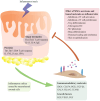Therapeutic potential of adipose derived stromal cells for major skin inflammatory diseases
- PMID: 38463491
- PMCID: PMC10921940
- DOI: 10.3389/fmed.2024.1298229
Therapeutic potential of adipose derived stromal cells for major skin inflammatory diseases
Abstract
Inflammatory skin diseases like psoriasis and atopic dermatitis are chronic inflammatory skin conditions continuously under investigation due to increased prevalence and lack of cure. Moreover, long-term treatments available are often associated with adverse effects and drug resistance. Consequently, there is a clear unmet need for new therapeutic approaches. One promising and cutting-edge treatment option is the use of adipose-derived mesenchymal stromal cells (AD-MSCs) due to its immunomodulatory and anti-inflammatory properties. Therefore, this mini review aims to highlight why adipose-derived mesenchymal stromal cells are a potential new treatment for these diseases by summarizing the pre-clinical and clinical studies investigated up to date and addressing current limitations and unresolved clinical questions from a dermatological and immunomodulatory point of view.
Keywords: ADMSCs; cytokines; skin inflammation; stem cells; therapy.
Copyright © 2024 Galera, Svalgaard and Woetmann.
Conflict of interest statement
JS was employed by company StemMedical A/S. The remaining authors declare that the research was conducted in the absence of any commercial or financial relationships that could be construed as a potential conflict of interest.
Figures

Similar articles
-
Therapeutic effects of mesenchymal stem cells and their derivatives in common skin inflammatory diseases: Atopic dermatitis and psoriasis.Front Immunol. 2023 Feb 20;14:1092668. doi: 10.3389/fimmu.2023.1092668. eCollection 2023. Front Immunol. 2023. PMID: 36891306 Free PMC article. Review.
-
Mesenchymal Stem Cells and Extracellular Vesicles Derived from Canine Adipose Tissue Ameliorates Inflammation, Skin Barrier Function and Pruritus by Reducing JAK/STAT Signaling in Atopic Dermatitis.Int J Mol Sci. 2022 Apr 27;23(9):4868. doi: 10.3390/ijms23094868. Int J Mol Sci. 2022. PMID: 35563259 Free PMC article.
-
Human Adipose Tissue-Derived Mesenchymal Stem Cells Attenuate Atopic Dermatitis by Regulating the Expression of MIP-2, miR-122a-SOCS1 Axis, and Th1/Th2 Responses.Front Pharmacol. 2018 Nov 6;9:1175. doi: 10.3389/fphar.2018.01175. eCollection 2018. Front Pharmacol. 2018. PMID: 30459600 Free PMC article.
-
Mesenchymal Stem Cell Therapy for Inflammatory Skin Diseases: Clinical Potential and Mode of Action.Int J Mol Sci. 2017 Jan 25;18(2):244. doi: 10.3390/ijms18020244. Int J Mol Sci. 2017. PMID: 28125063 Free PMC article. Review.
-
Subcutaneous Injection of Allogeneic Adipose-Derived Mesenchymal Stromal Cells in Psoriasis Plaques: Clinical Trial Phase I.Cell J. 2023 Jun 28;25(6):363-371. doi: 10.22074/cellj.2023.1973793.1167. Cell J. 2023. PMID: 37434453 Free PMC article.
References
-
- Friedenstein AJ, Chailakhyan RK, Latsinik NV, Panasyvk AF, Keiliss-Borok IV. Stromal cells responsible for transferring the microenvironment of the hemopoietic tissues: cloning in vitro and retransplantation in vivo. Transplantation. (1974) 17:331–40. doi: 10.1097/00007890-197404000-00001 - DOI - PubMed
Publication types
LinkOut - more resources
Full Text Sources

